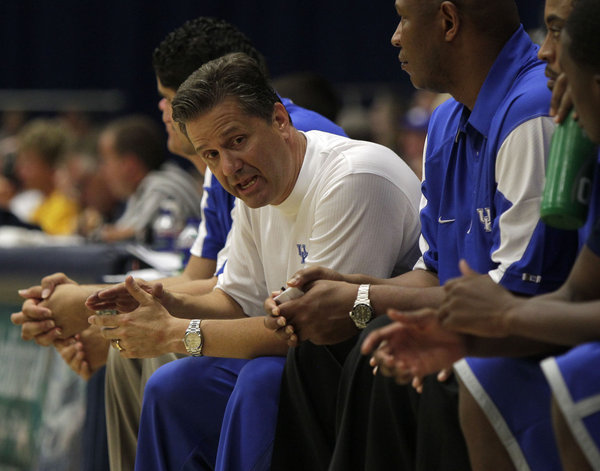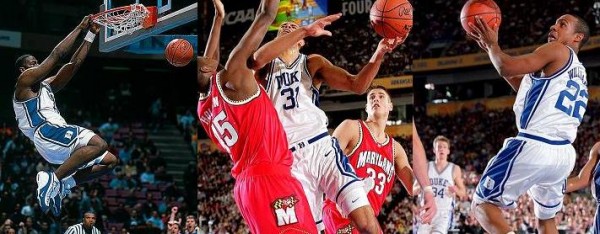Is Calipari’s Three-Year Recruiting Run the Best Ever?
Posted by rtmsf on August 16th, 2010An interesting question came up among the Twitterati over the weekend when it was learned that Rivals #8 (and rising) recruit in the Class of 2011, Anthony Davis, had formally committed to Kentucky. Davis’ commitment marks the third top ten recruit in that class to have committed to John Calipari’s Wildcats, and the seventh in the 2009-11 recruiting cycles, a ridiculous feat.
-
John Wall (#2, 2009)
-
DeMarcus Cousins (#3 , 2009)
-
Brandon Knight (#4, 2010)
-
Enes Kanter (#7, 2010)
-
Michael Gilchrist (#1, 2011)
-
Marquis Teague (#5, 2011)
-
Anthony Davis (#8, 2011)
Throw in a few other high-level recruits such as Daniel Orton (#19, 2009), Eric Bledsoe (#52, 2009), Terrence Jones (#11, 2010), Doron Lamb (#26, 2010), and an unnamed superstar or two to be named later (Quincy Miller? LeBryan Nash?), and suddenly there is a realization that we could be in the midst of the single greatest run of recruiting prowess since the Wizard of Westwood had every blue-chipper from coast to coast lining up to play for him.
This is what Calipari was referring to when he infamously said on draft night in June that having five UK players selected was the greatest night in the program’s history. It’s all marketing. As Kentucky blog A Sea of Blue notes when referring to Anthony Davis’ quotes about the commitment, Calipari isn’t selling the Wildcat program of all hoops-all the time as much as the dream; the dream, of course, being a fast-track to the League.
But notice what is not mentioned — Kentucky tradition, the facilities at UK, playing in front of 24,000 every game, being on TV all the time — none of these things are mentioned. Recruiting has changed. Calipari has taken the NBA one-and-done rule and used it like the Pied Piper, tempting players to Kentucky not with cash to families or under-the-table deals, but with a short path to all the riches they desire.
Whether you believe the last sentence or not, the truth remains that players are beelining for Lexington, which brings us to the point of this article. We have to dig pretty deep in our memory banks to remember a recruiting run that even begins to approach this concentration of elite talent. Granted, there’s a bit of an apples/oranges confounder here — much of the reason that Calipari can load up on talent every single year is because there’s a reasonable expectation that the previous year’s competition for minutes will be gone (see: Wall begets Knight begets Teague, for example). Still, we’ve come up with one strong comparison in the modern era (we hope you add your own in the comments below): Duke 1997-99. As a brief aside, UNC from 1990-93, Michigan from 1991-94 and Duke from 1999-2002 were also very strong periods of recruiting at those schools, but over four recruiting cycles rather than three.
Duke 1997-99 (recruited by Mike Krzyzewski)
- Elton Brand (#1, 1997)
- Chris Burgess (#7, 1997)
- Shane Battier (#8, 1997)
- William Avery (#14, 1997)
- Corey Maggette (#16, 1998)
- Jason Williams (#3, 1999)
- Carlos Boozer (#8, 1999)
- Casey Sanders (#16, 1999)
- Mike Dunleavy, Jr. (#26, 1999)
The recruiting rankings alone are nasty, but when you consider the actual accomplishments of this group, it takes on a whole new meaning. Six lottery picks, three NPOYs, two title game appearances and a national championship (2001). In two of the years where they didn’t cut the nets down, (1999 and 2002), Duke was the prohibitive favorite to win the title (finishing #1 in the final AP poll every year from 1999-2002) in large part because they had more talent than anybody else. They actually won it all in 2001, but we’re still trying to figure out how Jim Calhoun’s vastly underrated (but also undermanned) Huskies were able to slay the Duke dragon in 1999 (oh, right, Trajan Langdon). It was an amazing run of talent acquisition, and we haven’t seen anything like it for at least a decade.
Therein lies the rub. With boatloads of talent comes expectations, and winning the press conference is great for tone-setting, but getting to and winning Final Fours is what matters most in Lexington. Again, the Duke era was different in that with the exception of Corey Maggette in 1999, Coach K did not lose any players as 1-and-dones; but that won’t deter the vultures from ripping Calipari if he continues to sign elite talent without bringing back the accompanying hardware to support it. The biggest case in point of this thinking is how Michigan’s Fab Five class of 1991 is often considered a failure for merely going to two straight NCAA championship games and losing. It remains to be seen how this era of Kentucky basketball will play out (so far, one Elite Eight appearance), but we already know that the level of recruiting enjoyed by Calipari in his first three classes there rivals anything experienced in the modern era. Coach K’s classes from 1997-99 set the bar very high — it’s now up to the individual players — from Knight/Kanter/Jones to Gilchrist/Teague/Davis — to match or exceed their accomplishments.












































